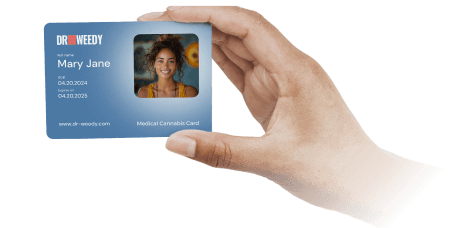Louisiana medical marijuana card FAQ
When applying for a medical marijuana card in Louisiana, you need to provide the physician or a state-licensed medical cannabis clinic with a government issued ID, medical records, and proof of Louisiana residency.
A qualifying patient under 18 years old needs a caregiver, but this must be their parent or legal guardian. Louisiana does not have a process for appointing a caregiver, but state-licensed dispensaries allow patients to appoint representatives in purchasing medical cannabis.
Once the licensed physician sees that you meet the eligibility, they will enter your information into the state registry and send it to the dispensary you choose. You can start purchasing cannabis within 24 to 48 hours.
In Louisiana, the records of medical cannabis treatments are kept private under the Health Insurance Portability and Accountability Act. All information about the medical cannabis patients must be protected, except in certain instances to law enforcement and employers. But, patients can receive a report on why and when their information was revealed.
Only medical marijuana physicians in Louisiana can prescribe medical cannabis to qualifying patients. The physician must be licensed by the Louisiana State Board of Medical Examiners and be in good standing. They must also have a bonafide physician-doctor relationship with the patient.
No, you cannot purchase medical marijuana with insurance in Louisiana. You can contact your insurance provider to learn more.
You can purchase medical marijuana from state-licensed dispensaries in Louisiana. Patients can also inform pharmacies about a caregiver who would purchase on their behalf. Check the license of a marijuana retailer before you purchase from them.
The primary thing you need is your state-issued recommendation from the physician. Your name would have been entered into the state database of medical cannabis patients, making it easy for the pharmacy to verify your information. You can also visit the dispensary without the medical marijuana card due to the Prescription Monitoring Program database.
As of the most recent statistics of 2023, approximately 30,000 Louisiana residents have enrolled in Louisiana’s medical cannabis program. This number continues to grow as more patients seek out medical cannabis as a treatment option under the state’s regulated program.
To register with the Louisiana medical marijuana program, schedule an appointment with a licensed physician or visit a medical cannabis clinic. Provide the physician with your government-issued ID, medical records, and proof of Louisiana residency. Once found eligible, the physician will send the recommendation to the preferred pharmacy and also provide you with a copy.
Yes, you need to be a Louisiana resident. Under the Louisiana Therapeutic Marijuana Program, patients must provide proof of state residency to the physician.
In Louisiana, patients can obtain a recommendation from the physician online through telemedicine services.
Minors under 18 years who have one of the qualifying conditions in Louisiana cannot directly apply for a medical marijuana certificate. They can only obtain certification from the physician through their parents or legal guardian. Minors with autism must receive their prescription from a pediatrician or pediatric subspecialist.
To renew the medical marijuana recommendation, a patient needs to be re-evaluated by their physician after one year. The physician will issue the certificate if the patient still qualifies and forward the certification to the dispensary of the patient’s choice.
As long as the physician sees that you are still eligible during your appointment, they can send your certification to the pharmacy directly within 24-48 hours.
Your medical marijuana recommendation is valid for a year. The patient must be re-evaluated annually.
No, you cannot grow your own cannabis in Louisiana. Patients, caregivers and dispensaries are not allowed to grow cannabis. Louisiana issues two cultivation licenses per year to growers in the state.
According to House Bill No. 612, there is a 10% tax on each cannabis retail sale.
You don’t necessarily need to hold your physician recommendation when purchasing cannabis products in Louisiana. The licensed physician will send your medical marijuana certification to the dispensary, making it easy to check your information.
With a medical marijuana certification in Louisiana, it is illegal to own a gun. Under the Gun Control Act of 1968, guns are off-limits to users of Schedule I drugs.
At the federal level, owning both an MMJ card and a concealed carry permit is prohibited. While Louisiana state laws allow for medical cannabis use, they are in partial contradiction with federal regulations regarding firearms. The federal government views marijuana use, even for medical purposes, as incompatible with gun ownership. Therefore, lawyers generally recommend that patients choose between medical cannabis use and owning firearms to avoid potential legal complications.
Under the House Resolution No. 269, employers are not allowed to discriminate against medical marijuana patients. These employees are also protected from drug tests. But, this law does not protect federal employees.
In Louisiana, having a medical cannabis card does not provide blanket protection from being fired if you test positive for cannabis. While employers cannot discriminate against you solely for having a medical cannabis card, they are allowed to enforce drug-free workplace policies, especially if your job is safety-sensitive or governed by federal law. Therefore, it's important to be aware of your employer's policies and your rights under state and federal law.
No, you cannot smoke marijuana in public, even if you possess a medical marijuana card. Louisiana law prohibits smoking in public places, which extends to the smoking or vaporizing of cannabis. Designated areas for consumption may exist, but generally, cannabis must be consumed in private spaces. However, you are allowed to use non-smoking forms of cannabis, such as edibles or tinctures, in accordance with state regulations.
Get your medical marijuana card
Plant your health with Dr. Weedy. Get all the benefits of a medical card at a low price for a year



























